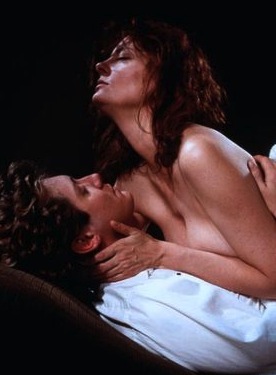Sunday, October 28, 1990.
WHITE PALACE. Written by Ted Tally and Alvin Sargent, based on the 1990 novel by Glenn Savan. Music by George Fenton. Directed by Luis Mandoki. Running time: 103 minutes. Restricted entertainment with the B.C. Classifier's warning: "some nudity, suggestive scenes and very coarse language."
HE'S UNEASY. ST. LOUIS advertising executive Max Baron (James Spader) is not comfortable with sexually aggressive women.
He's embarrassed by emotional displays, discomfited by disorganization and suspicious of spontaneity.
She's uneasy. White Palace counterwoman Nora Baker (Susan Sarandon) is not comfortable with social obligations.
She's nervous about sitting down with Max's family and friends for Thanksgiving dinner. Addictive and assertive, she both expects and resents condescension.
She's known him since the night that Neil Horowitz (Jason Alexander) had his stag party. She was on the fast-food restaurant's cash register when Max, in full formal dress, came in to complain about being short-changed on a job-lot burger order.
Later that night, she spotted him in a seedy bar. "What are you doing in a dump like this?" she asked in her most inviting manner.
"I'm having a drink," he said with a chilling lack of interest.
Still later that night, too drunk to drive home, he accepted her offer of a couch. He dreamt of his late wife Jane (Maria Pitillo), dreamt of Jane coming to him to make love, and awakened to feel Nora's touch.
He never planned to see her again. The next day, though, he was back at her door.
"I'm 43," she'd said challengingly. "Be 44 in December."
"I'm 27," he'd said. After a moment's pause, they were all over one another.
I'm uneasy. Although the bits don't quite fit, White Palace director Luis Mandoki keeps upping the dramatic ante like a poker player with a winning hand.
On the table is a basic boy-meets-girl, boy-enjoys-the-best-sex-he's-ever-had plot. The question is, is it love?
More to the point, is the Mexican-born film-maker offering us social realism or erotic fantasy? He begins with a feint to the left.
Standing in the way of a happily-ever-after ending are matters of culture, class, religion and style. He's a refined, college-educated, upwardly mobile Volvo driver. Liberal and Jewish, Max is fastidiously neat and something of a workaholic.
She's down and dirty. Raised Catholic, Nora is one of the working poor, coarse, slovenly, uninformed and cheap. And, while we're listing differences, add age.
Mandoki, confident that he can make us believe in this match, insists upon making Nora old enough to be Max's mom.
Sarandon, who celebrated her 44th birthday earlier this month [1990], is a riveting performer. In keeping with Nora's character, she allows make-up artist Ron Specter to give her a haggard, care-worn look.
Suddenly, the director feints to the right, and into the realm of fantasy.
Stripped for the requisite sex scenes, Sarandon's healthy, attractive body is all wrong for Nora, already established as a chain-smoking, alcoholic, junk-food addict.
Clearly, Mandoki is hedging his creative bet and indulging in some calculated misdirection. Before we start asking awkward questions about why someone like Max would go into her kind of bar for a drink, he focuses our attention on country matters.
If the drama is to work, Mandoki must convince us that there is something going on between Nora and Max other than lust, an exchange of something other than bodily fluids.
He can't and it doesn't. Under scrutiny, there isn't a character or incident in the tale that holds up.
While pretending to truth, White Palace peddles a selection of shopworn romantic fantasies.
The above is a restored version of a Province review by Michael Walsh originally published in 1990. For additional information on this archived material, please visit my FAQ.
Afterword: As noted in the review above, Susan Sarandon had just turned 44 when White Palace was released. James Spader, who was 30, was credible as the younger man enthralled with a self-assured "older" woman. And Sarandon, already a best actress Oscar nominee (for 1982's Atlantic City), was expert at enthralling audiences. Among her early roles were the wide-eyed ingenue Janet Weiss, whose rendition of Touch-a, Touch-a, Touch Me was among the show stoppers in the 1975 cult hit The Rocky Horror Picture Show. She displayed cool competence as a scientist dealing with a vampire queen in 1983's The Hunger, and cast a mean spell as one of The Witches of Eastwick (1987). Then came Bull Durham, the 1988 sports comedy in which she played baseball players' muse Annie Savoy on screen, and won the heart of co-star Tim Robbins in real life. Sarandon received three more Oscar nominations — for Thelma & Louise (1991), Lorenzo's Oil (1992) and The Client (1994) — before winning the award for her performance as Sister Helen Prejean in 1995's Dead Man Walking. Directing her to that win was her companion, Tim Robbins.
See also: Other films featuring Susan Sarandon on file in the Reeling Back archive include Billy Wilder's The Front Page (1974) and Robert Altman's The Player (1992).
